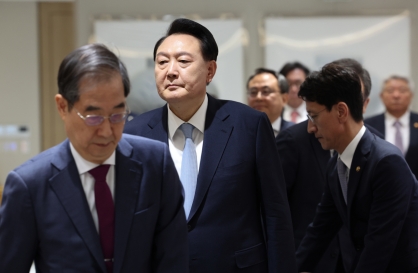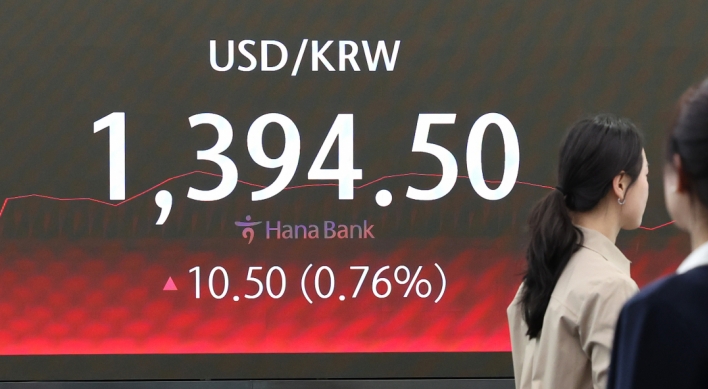[John M. Crisp] Trump loves military, but from safe distance
By Korea HeraldPublished : Nov. 7, 2018 - 17:03
Andy Thomas’s painting, “The Republican Club,” achieved some notoriety recently when it was discovered hanging in a prominent location in the Trump White House. You’ve probably seen his kitschy rendering of nine Republican presidents -- Reagan, the two Bushes, Lincoln, Eisenhower, Ford, Teddy Roosevelt, Nixon and Trump -- huddling together for a drink and a few laughs.
Lesser-known Republicans of the past, such as Taft and Coolidge, appear less distinctly in the painting, but the focus is on the more recognizable presidents around the table in the foreground.
At the center of the group is President Donald Trump, portrayed as handsome, relaxed, convivial and extremely fit. Which probably explains why the painting is hanging in the White House.
Ordinary personalities might see a certain droll humor in such a painting, the kind found in the bullfight posters you can buy in Mexico with your own name printed alongside two famous matadors. But this kind of self-deprecatory, ironic jest is lost on Trump, who has never been shy about comparing himself to the greatest presidents, including Washington and Lincoln.
But it took a few moments of staring at this portrayal of Trump among the presidents to realize he is different from the rest in a significant way: All eight of the other presidents gathered around the table with Trump served their country in uniform.
At least four of them -- Roosevelt, Ford, Eisenhower and Bush Sr. -- saw real combat. George H.W. Bush, shot down in the Pacific, is a true war hero.
The rest served in war, as well, including Lincoln, who volunteered during the Black Hawk War of 1832 and was promptly elected captain of his company.
Among the lesser-known Republican presidents, some of whom are in the painting’s background, James Garfield was a major general in the Union Army; Rutherford B. Hayes was wounded five times in the Civil War; Chester Arthur served in the war as well; Benjamin Harrison commanded men in combat in at least nine battles; William McKinley saw heavy combat at Antietam and elsewhere; and then there is Ulysses S. Grant.
Trump missed his generation’s war -- Vietnam -- because of bone spurs and four college deferments. But my own four years as a humble enlisted man in the US Navy suggest to me that the military might not have been a good fit for Trump.
Military service, even in peacetime, requires a bit of selflessness and a dash of humility. It calls for a willingness to be part of a unit in service of a bigger cause, to take orders and to give up being the center of attention, all for comparatively modest pay. These are qualities that are hard to associate with Donald Trump.
Of course, military service isn’t essential to good leadership, and our nation has had good presidents who were never in the military.
But if Trump had left the real estate empire into which he was born long enough to serve in the military and perhaps even in Vietnam, he might be less casual about the use of force and less confident about its ability to solve complicated problems.
He might be less fond of military parades, less likely to deploy troops to the border, less likely to build up our nuclear forces and abrogate arms-limiting treaties. And he might be less inclined to threaten North Korea and Iran with “fire and fury.”
Trump once claimed he knows “more than the generals.” But few are more conservative about the use of force than generals and other soldiers who have actually been in combat. They understand that military power is a blunt instrument and that the consequences of its use are unpredictable, except for its one extremely predictable consequence: human suffering. They have seen the costs up close.
Now, unfortunately, the commander of the world’s most powerful military never learned, neither from battle nor books, the limits and dangers of force that many of his predecessors understood from seeing war itself. That Trump is not awed by his awesome power is extremely dangerous.
By John M. Crisp
John M. Crisp, an op-ed columnist for Tribune News Service, lives in Georgetown, Texas. -- Ed.
(Tribune Content Ageny)
Lesser-known Republicans of the past, such as Taft and Coolidge, appear less distinctly in the painting, but the focus is on the more recognizable presidents around the table in the foreground.
At the center of the group is President Donald Trump, portrayed as handsome, relaxed, convivial and extremely fit. Which probably explains why the painting is hanging in the White House.
Ordinary personalities might see a certain droll humor in such a painting, the kind found in the bullfight posters you can buy in Mexico with your own name printed alongside two famous matadors. But this kind of self-deprecatory, ironic jest is lost on Trump, who has never been shy about comparing himself to the greatest presidents, including Washington and Lincoln.
But it took a few moments of staring at this portrayal of Trump among the presidents to realize he is different from the rest in a significant way: All eight of the other presidents gathered around the table with Trump served their country in uniform.
At least four of them -- Roosevelt, Ford, Eisenhower and Bush Sr. -- saw real combat. George H.W. Bush, shot down in the Pacific, is a true war hero.
The rest served in war, as well, including Lincoln, who volunteered during the Black Hawk War of 1832 and was promptly elected captain of his company.
Among the lesser-known Republican presidents, some of whom are in the painting’s background, James Garfield was a major general in the Union Army; Rutherford B. Hayes was wounded five times in the Civil War; Chester Arthur served in the war as well; Benjamin Harrison commanded men in combat in at least nine battles; William McKinley saw heavy combat at Antietam and elsewhere; and then there is Ulysses S. Grant.
Trump missed his generation’s war -- Vietnam -- because of bone spurs and four college deferments. But my own four years as a humble enlisted man in the US Navy suggest to me that the military might not have been a good fit for Trump.
Military service, even in peacetime, requires a bit of selflessness and a dash of humility. It calls for a willingness to be part of a unit in service of a bigger cause, to take orders and to give up being the center of attention, all for comparatively modest pay. These are qualities that are hard to associate with Donald Trump.
Of course, military service isn’t essential to good leadership, and our nation has had good presidents who were never in the military.
But if Trump had left the real estate empire into which he was born long enough to serve in the military and perhaps even in Vietnam, he might be less casual about the use of force and less confident about its ability to solve complicated problems.
He might be less fond of military parades, less likely to deploy troops to the border, less likely to build up our nuclear forces and abrogate arms-limiting treaties. And he might be less inclined to threaten North Korea and Iran with “fire and fury.”
Trump once claimed he knows “more than the generals.” But few are more conservative about the use of force than generals and other soldiers who have actually been in combat. They understand that military power is a blunt instrument and that the consequences of its use are unpredictable, except for its one extremely predictable consequence: human suffering. They have seen the costs up close.
Now, unfortunately, the commander of the world’s most powerful military never learned, neither from battle nor books, the limits and dangers of force that many of his predecessors understood from seeing war itself. That Trump is not awed by his awesome power is extremely dangerous.
By John M. Crisp
John M. Crisp, an op-ed columnist for Tribune News Service, lives in Georgetown, Texas. -- Ed.
(Tribune Content Ageny)
-
Articles by Korea Herald







![[KH Explains] How should Korea adjust its trade defenses against Chinese EVs?](http://res.heraldm.com/phpwas/restmb_idxmake.php?idx=644&simg=/content/image/2024/04/15/20240415050562_0.jpg&u=20240415144419)











![[Today’s K-pop] Stray Kids to return soon: report](http://res.heraldm.com/phpwas/restmb_idxmake.php?idx=642&simg=/content/image/2024/04/16/20240416050713_0.jpg&u=)